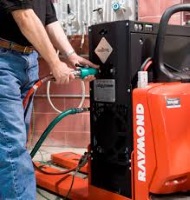Complete Powerpoint slide presentation for forklift instructors. Ready made training course
Choosing the correct motive power for the job
 It has to be said that sometimes this choice will be made for you. Should your application only require a small truck for light loads then you will end up with an electric powered forklift as internal combustion engines are not fitted to very small capacity forklifts. On the other hand should you require a very large capacity forklift truck you are unlikely to find it driven by an electric motor.
It has to be said that sometimes this choice will be made for you. Should your application only require a small truck for light loads then you will end up with an electric powered forklift as internal combustion engines are not fitted to very small capacity forklifts. On the other hand should you require a very large capacity forklift truck you are unlikely to find it driven by an electric motor.
The advantages and disadvantages of each of the three types of motive power for forklift trucks are listed below.
ELECTRIC powered forklift trucks. |
ELECTRIC powered forklift trucks. |
Advantages:
|
Disadvantages:
|
| DIESEL powered forklift trucks. | DIESEL powered forklift trucks. |
Advantages:
|
Disadvantages:
|
| LIQUIFIED PETROLEUM GAS powered forklifts | LIQUIFIED PETROLEUM GAS powered forklifts |
Advantages:
|
Disadvantages:
|
There seems to be an urban myth that states that LP Gas is safe to use inside. In fact, LP Gas gives off toxic fumes and that's with a correctly adjusted engine! It's true it won't contaminate product in the way diesel can but it must be emphasised that indoor use is only safe under well ventilated conditions.
Brief exposures to concentrations of propane up to 10,000 parts propane per million parts of air (ppm) do not cause any symptoms in humans. Exposures to very high concentrations of propane (100,000 ppm) can produce slight dizziness after a few minutes of exposure. At extremely high concentrations (several hundred thousand parts per million), propane acts as an asphyxiant by displacing oxygen. This means one could suffocate if exposed to high enough concentrations of propane because it dilutes the oxygen in the air.
Download HSE guide on bulk LP Gas storage.
It's worth noting that other forms of propulsion are being investigated and Yale forklifts already have a truck that runs on hydrogen!